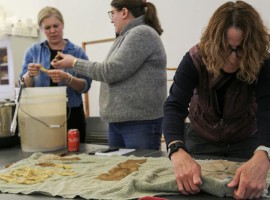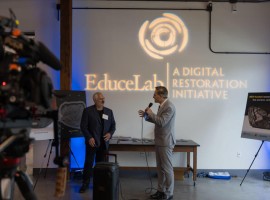'Behind the Blue': UK’s New Vice President for Institutional Diversity Katrice A. Albert
A national leader with more than 25 years of experience at some of the country’s leading institutions has been selected as the University of Kentucky’s next vice president for institutional diversity.
Katrice A. Albert, Ph.D., will begin her duties as vice president for institutional diversity on Sept. 27, according to an announcement from UK President Eli Capilouto.
Highlights of Albert’s career in leading diversity and education efforts include:
- Serving as the top diversity officer and a senior executive at Louisiana State University and the University of Minnesota system as well as the NCAA, where she also led Human Resources.
- Authoring two volumes of work around issues of race, racial equity and mental health. She is the author of a forthcoming work on leadership in intercollegiate athletics.
- Serving on the editorial board of the Journal of Community Engagement. Albert also has been published in other academic journals related to psychology, counseling and development.
- Teaching graduate-level courses in multicultural counseling, the politics of race and gender, and serving as an adjunct faculty member in education at LSU.
- Consulting with some of the leading governmental, civic, religious, private, public and nonprofit sector institutions throughout the country on issues of diversity, development and strategy. Clients have included: the U.S. Department of Homeland Security, American Red Cross, the Neiman Marcus Group and the Universities of Notre Dame, Nebraska, West Florida and Central Florida.
On this edition of "Behind the Blue," UK Chief Communications Officer Jay Blanton talks with Albert about what she’s looking forward to in joining UK, particularly at this moment, as the institution is engaged in a broad-based and expansive effort around diversity, equity and inclusion (DEI).
You can read more about UK’s DEI efforts here: https://dei.uky.edu/.
You can read Capilouto’s message to the campus about Albert here.
"Behind the Blue" is available on iTunes, Google Play, Stitcher and Spotify. Become a subscriber to receive new episodes of “Behind the Blue” each week. UK’s latest medical breakthroughs, research, artists and writers will be featured, along with the most important news impacting the university.
For questions or comments about this or any other episode of "Behind the Blue," email BehindTheBlue@uky.edu or tweet your question with #BehindTheBlue. Transcripts for this or other episodes of "Behind the Blue" can be downloaded from the show’s blog page.
[MUSIC PLAYING]
KODY KISER: Welcome to Behind the Blue. I'm Kody Kiser with UK Strategic Communications. A national leader with more than 25 years of experience at some of the country's leading institutions has been selected as the University of Kentucky's next Vice President for Institutional Diversity. Dr. Katrice A. Albert will begin her duties as Vice President for Institutional Diversity on September 27, according to an announcement from UK President Eli Capilouto.
Highlights of Albert's career in leading diversity and education efforts include serving as the top diversity officer and a senior executive at Louisiana State University and the University of Minnesota system, as well as the NCAA, where she also led Human Resources. Authoring two volumes of work around issues of race, racial equity, and mental health, she is the author of a forthcoming work on leadership in intercollegiate athletics. Serving on the editorial board of the Journal of Community Engagement, Albert also has been published in other academic journals related to psychology, counseling, and development, teaching graduate-level courses in multicultural counseling, the politics of race and gender, and serving as an adjunct faculty member in education at LSU, and consulting with some of the leading governmental, civic, religious, private, public, and nonprofit sector institutions throughout the country on issues of diversity, development, and strategy.
Her clients have included the US Department of Homeland Security, the American Red Cross, the Neiman Marcus Group, and the Universities of Notre Dame, Nebraska, West Florida, and Central Florida. On this episode of Behind the Blue, UK Chief Communications Officer Jay Blanton talks with Albert about what she's looking forward to in joining UK, particularly at this moment, as the institution is engaged in a broad-based and expansive effort around diversity, equity, and inclusion.
[MUSIC PLAYING]
JAY BLANTON: Katrice, thanks for joining us today for Behind the Blue. And welcome to the Big Blue Nation.
DR. KATRICE A. ALBERT: Well, thank you so much, Jay. I'm very excited to be a part of the Big Blue Nation and to join Kentucky.
JAY BLANTON: We always like to start with our guests asking a basic question, if you could just tell us a little bit about what led to this moment and joining UK?
DR. KATRICE A. ALBERT: Yeah, so I'm so excited to be with you. And it's remarkable when institutions really want to accelerate and drive the promise of the possibilities that diversity, equity, and inclusion can have for community. I've done this work for about 25 years. And it was just exciting to see the possibilities of being a part of the vision with President Capilouto and the students, faculty, and staff, and the community of Kentucky.
JAY BLANTON: So Katrice, can you tell us a little bit about your family and what it was like growing up in Louisiana?
DR. KATRICE A. ALBERT: Yeah, so I'm from a small town called New Roads. And we have False River, which is a man-made lake. And it was like-- it's a little resort town.
The people of New Roads have a very distinctive work ethic, very much like Kentucky, agriculture. We harvest seven crops for the state. And so that's the most crops of any parish.
My family believed in really being committed to their faith. We were committed to food. And we were committed to football. And so the F's are dependent on Saturday night. Those would sort of move around in terms of order of importance.
I am the first born to my parents. And I have a younger brother who's 16 years younger than me. We don't have any siblings in between us. And my parents often said we had one child too young, as young people, and then we have one child too old, as old people. We really enjoy one another. And as much as I can get back to Louisiana to visit with them and my grandmothers, I do.
JAY BLANTON: I see. Talk a little bit, just reading your bio, clearly education was important to you and your family. Can you talk a little bit about the importance of education, how central it was?
DR. KATRICE A. ALBERT: Yeah, so education attainment was really key in our family. One of my grandfathers was the first African-American to have an LLC. And so he was really hard pressed to make sure that we all had access and opportunity to education.
And I was really inspired by Katharine Drexel, who founded my undergraduate alma mater, Xavier University of Louisiana. And she was just an ordinary woman who did extraordinary things. She had a chance to visit with Pope Leo XIII. And she told Pope Leo XIII, look, I mean, the Catholic church should be doing something around education for Blacks and Indigenous populations. And Pope Leo told her, look, you think you're looking at the Church, but I'm looking at the Church. And so Katharine, you have to do something.
And she used her fortune to create schools. And so she's just a muse. She says we have to press forward and fear nothing. And so the education attainment is really, really important to me, to create access and opportunity for others.
JAY BLANTON: Psychology was your area of study--
DR. KATRICE A. ALBERT: Yes.
JAY BLANTON: --your academic discipline that you majored in. What got you interested in that?
DR. KATRICE A. ALBERT: Well, I was always very interested in the connection of people, and again, had the opportunity in New Roads to go to parochial schools. So I was one of very few African-American students in my maturation in K-12. And so I was always interested, because I was sort of a window into the Black community for my white friends. And they were for me, right?
And so it just was so interesting to me that we all want the same things. We all want to have families that are healthy and happy. But there was just something about the divide that was just curious to me. And so the route to psychology was just about the relationships and the engagement of people and just sort of our nuanced ways of being with one another. And so that's how I really got focused in on psychology.
JAY BLANTON: I mean, I could see where there would be a pretty easy bridge between psychology and work around diversity, equity, and inclusivity. What, though, got you really interested? Because early on in your career, you started to work in that space.
DR. KATRICE A. ALBERT: That's right.
JAY BLANTON: So what led you specifically down that path?
DR. KATRICE A. ALBERT: Yeah, so it was just so interesting that I was doing all of this research on just the founding fathers and mothers of psychology and all of the theories that you would use to do therapy. And then I just was not able to make the connection for newer psychology modalities for people of color or those that were more underrepresented. So my focus then became, well, how do I do this in a really genuine and authentic way for those that may see me as their top choice to do either individual therapy or family therapy?
And so I just really got sort of honed in on thinking about research for those who were more minoritized communities in the field, and then had the opportunity to be in graduate school and doing graduate assistantships chips in the Office of Multicultural Affairs. And then I did my residency at the Center for Multicultural Training in Psychology. So that was really driving me to a path of the work around race and gender and sexual orientation and thinking about the demographics that people might bring to the therapy office.
JAY BLANTON: You've kept teaching throughout and writing and publishing. But you did move into more of a working in administrative space around DEI. What spurred your interest there to work more over time into in that space?
DR. KATRICE A. ALBERT: Yeah, well, sometimes people see things in you that you don't see in yourself. And so I just knew that I would always be committed to student development and student maturation. But in the course of just having the ability to think about the strategy of how do we do this better, I was just able to sort of work my way up and get trained up by people who were thinking about how do institutions of higher education really turn the dial on diversity and equity and outreach? And so the job promotions just came as a result of cutting my teeth, right, with student success and student access and giving students and faculty more opportunity, but then also trying to create the strategy so that we might be able to race ahead and have more success in a more nimble way.
JAY BLANTON: You've been a chief diversity officer and a senior executive and a lot of other hats at some pretty big places-- Louisiana State University, the University of Minnesota system, and the NCAA before moving over to the private sector. Can you tell us a little bit about what that through line is there? What led to those opportunities? Why did you think about moving to different places and doing it? Because I don't know of too many people that have been a senior executive at those kinds of places and working in DEI.
DR. KATRICE A. ALBERT: Yeah. So, I mean, at LSU it was my home state. So it was really giving back to the state's people, right, at the flagship institution, a land grant institution committed to making sure that everyone had access and opportunity to higher education. Moving over to the Minnesota system, I was to be able to do that work for the five campuses, right, so to think strategically about DE&I, how do we create cultures of belonging at these various campuses that have different sort of roles and scopes across the state? And then to do it for the NCAA was to really hone in on our student athletes and to think about how do we create the best environments for our students who can enjoy their sport, but to do that while they had academic success? They were competing at the highest level in their sport, but then also becoming student leaders.
So I think the red thread, as the French talk about, is really at each one of those places that really focused in on a commitment to compassionate leadership, a commitment to a care across the board, right, for their students, their faculty, their staff, alumni. And it was really about how do we drive and accelerate the promise, right? And so being able to do that for the private sector through the consulting work was to just really juxtapose everything that I learned and I read to be able to give it to these other sectors, who at some point can struggle, but at other points can go much faster than higher ed.
JAY BLANTON: How is that work, working in private consulting now, most recently in your own consultancy and working for consultants and organizational behavior and strategy? How has that or has it informed your work now?
DR. KATRICE A. ALBERT: Mhm, mhm. Well, I think nationally, to be able to get that national perspective with various sectors-- so the private sector, for-profit, K-12, governmental entities, religious organizations, I think it just demonstrates that we all want better for our people, right? And so it's almost like at Kentucky, the North Star is about taking care of people. How do we have that connection to everyone? How do we make the culture better for everyone to succeed and to have their fullest potential be realized?
So whether that's through doing this work because our leaders want to become leaders among leaders, to say "we want to embody the very mission and vision of our organization," and how do we do that? We create these cultures of belonging. And so I think that it has informed because nationally, we all want the same things.
JAY BLANTON: Why UK? And why now? And what interested you in this role at this time?
DR. KATRICE A. ALBERT: Yeah, so I just think that the vision is so broad that President Capilouto has set forth. There is such opportunity, right, to impart and to walk alongside each of those change agents at Kentucky, who see health and economic vitality, a commitment to all people, and a culture of care, right? And so right now, as the flagship and as the land grant mission, the land grant mission can be realized if we are able to really push forward with diversity, equity, inclusion, racial justice, economic justice, the ways in which we're able to really drive home that we can accelerate exactly what everyone needs at Kentucky if we do it better together.
This is not anything, Jay, that we don't-- we get nowhere alone. Right, and so why now? Because I see the vision of doing this together.
JAY BLANTON: Over a career with some of these places that we've talked about, what have you learned from moments of success? And what have you learned from moments that maybe weren't as successful?
DR. KATRICE A. ALBERT: Yes, so I think moments of success all relate to the people with whom I've worked, right? And so to see students matriculate into graduate programs and into medical school and into their careers and have their families, and then come back and say "thank you so much for being on this journey with me." I think the moments of success around being able to work with faculty and to see their research realized in publications. The success of communities, right, communities seeing the university as a partner, those are the moments where I'm saying to you, "success is about the connectivity with the people." I think over my career, I've had to realize that sometimes it's better to slow down in order to speed up, right?
So from this small town of New Roads, I can remember people telling me, "Young woman, you don't want grass to grow under your feet," meaning that I was always just going and trying to get to the end goal as fast as I possibly could, because I knew that people were connected to my work. But sometimes it's just better to slow down in order to speed up, to build coalitions, to build allyship, to get people to understand, we've got to be brought in together. So we get nowhere alone I think is part and parcel to the success of people's full potential being reached, but at the same time doing it successfully together.
JAY BLANTON: You don't start officially till later in September. And so we've got a chance to have an early conversation with you. We appreciate that. But as you start to prepare for the job-- and I you will be on campus some visiting the folks-- what are some of your first goals that you're going to try to accomplish?
DR. KATRICE A. ALBERT: Well, I definitely want to listen to the community, right? So I want to listen and learn from Kentucky. I want to grow with Kentucky and be embodied with everything that are change agents, especially those that are working on the diversity, equity, inclusion implementation plan. I want to learn about that. I want to get connected to our Blue Nation, our Big Blue Nation.
I want to see and I want to hear and feel the culture, right, because I know that it is important that joining a new culture, you have to have the understanding around being a cultural add. And that's what I want to do. I want to be able to make sure that I learn the team, right, in the Office of Institutional Diversity. I want to get reconnected with my search committee so that I can say thank you to them in person and just hear from them about their very high expectations that they're going to have. And I want to be able to determine how to exceed everyone's expectations in this journey together.
JAY BLANTON: So I know you've had some time to get acquainted with the DEI efforts to date at the university. What do you think about those efforts? And then do you have any initial thoughts-- it's a little unfair to ask this-- any initial thoughts about where things could go next or where you want to take help take those efforts?
DR. KATRICE A. ALBERT: Yeah, so I just appreciate the implementation plan being committed to students and faculty, right, so the ways in which we think about access and opportunity for our students and being very committed to accelerating, growing the faculty in all sorts of ways. So that means being able to attract the diverse top talent in the faculty ranks. I'm really excited about the cultural piece. So how do we really have an agenda that really sets us apart with creating a culture of belonging?
I'm also very excited about the implementation plan around the facilities and our finances, the ways in which we can think about art for all of our buildings and how we get a targeted supplier diversity program. So I just think that I want to be able to get acquainted with this plan in a real way. And then I think that the forward momentum and the promise of the possibilities of what's next will be done together.
So that's the thing. Everyone wants to say, "Well, Katrice, what's your vision for the future?" But my vision for the future has to be embodying the voices of many, right? So it's many people, but one university. So I want to be able to really just sort of hone in on all of the great success thus far and then come up with that strategy together.
JAY BLANTON: So Dr. Capilouto over the last year and a half has talked about the twin pandemics we've been facing, one that takes your breath away literally, COVID, the other that infects hearts and minds in a way, sort of the issues around structural racism that we've been talking about. Any thoughts about that and how we move forward, as we're still-- in many ways still very much in the middle of both those pandemics?
DR. KATRICE A. ALBERT: Mhm, mhm. I think President Capilouto is spot on, right? So we have been dealing with for 18 months this global pandemic, COVID-19, now the Delta variant that is a resurgence of pressures on our hospitals and our health-care heroes, but then also the racial reckoning, right? So after George Floyd's murder, we as a nation needed to really think about institutional racism, the ways in which cognitive biases create structural racism.
And so it is, I think, imperative that Kentucky will lean into the ways in which we are going to be better together, right, by trying to help solve the issue of COVID, right, doing our part individually and collectively. But it's also what it means to be leaders among leaders, to be compassionate, to have brave conversations, and to be very thoughtful about how we think through a more perfect union, right? So how do we deal with race? And how do we deal with racism and social injustice? Because we all contribute to the ways in which we're better together.
I think brave conversations, critical conversations are so necessary and so vital. We've got to be able to have these tough conversations and do it in compassionate ways. Brené Brown says we got to rumble with vulnerability, right? And she's just so masterful in the ways in which she says the way in which we get to joy and the ways in which we get to happiness and all of these masterful feelings is that we've got to go to some dark places sometimes. And vulnerability is not easy, right, to be able to say, "I don't know" or "I want to know more." So those brave conversations are so necessary.
JAY BLANTON: Anything you think we're missing that you would want to tell the University of Kentucky community as you're getting ready to start this new journey with us?
DR. KATRICE A. ALBERT: Yes. Well, I'm just delighted to be a part. The vision for the future is immense. We have a lot of power in the possibilities.
I'm reading this book, "Between Two Kingdoms." It's by Suleika Jaouad. And she says in this book to imagine yourself in the future is a radical act of hope. To imagine yourself in the future is a radical act of hope.
And I think I'm so hopeful to be joining a community very committed to DE&I, committed to community engagement, and committed to creating this culture of belonging that we all deserve. I don't think DE&I is something, a project that we'll ever complete, right? But I know that it is a requirement that it's a multigenerational sort of way of being so that we get to our very best selves each and every day.
JAY BLANTON: Katrice Albert, thank you for joining us on this episode of Behind the Blue. And we're so excited to have you join in our family.
DR. KATRICE A. ALBERT: Oh, thank you so much.
[MUSIC PLAYING]





